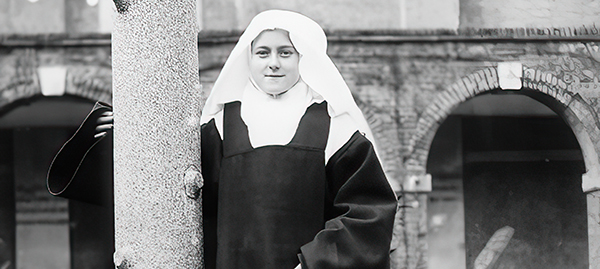
V/ I will turn to you O God,
R/ to God who gives joy to my youth
V/ Give me the Wisdom that sits by your throne;
R/ that I may be counted among your children
Lord, in your all-providential plan, you have led me to this moment to rediscover me in your Word and Wisdom. Aid me to make this time of meditation and prayer enriching, transforming, and liberating for my well-being and others. Amen!
A MYSTICISM OF GREAT DESIRES
By Shawn Ellison
St. Thérèse of Lisieux Feast Day
Isaiah 66:10-14; Psalm 131(130):1-3; Matthew 11:25-30
1st October 2025
Today we commemorate the Carmelite feast day of Saint Thérèse of the Child Jesus and the Holy Face, esteemed by Pope Pius X as the “greatest saint of modern times. Along with St. Teresa of Avila and St. John of the Cross, St. Thérèse is a Carmelite Doctor of the Church. While not as voluminous and systematic a writer as her Carmelite forbearers, Thérèse’s rapid widespread cultural impact is both compelling and robust. The childlike simplicity and invitational accessibility of Thérèse’s spirituality, speaks to new contemplative possibilities. As a Carmelite nun, she was deeply familiar with the mystical theologies of St. Teresa and St. John of the Cross. However, in spite of this familiarity, Thérèse wrote: “…I want to seek out a means of going to heaven by a little way, a way that is very straight, very short, and totally new.”I’ve always found this Thérèsian statement to be enigmatic, and perhaps, a subtle critique of the more structured mystical paths before her time.
Thérèse suggests that these extraordinary paths, while profound, can appear daunting in their complexity and prolonged duration. With humility and bold confidence, Thérèse affirms with St. Paul: “But I shall show you a still more excellent way” (I Corinthians 12:31). Thus, Thérèse proposes “a little way” that is more fitting for ordinary souls — the vast majority of contemplatives — who seemingly do not manifest extraordinary mysticism at all.
In Thérèse’s well-known elevator passage in Story of a Soul, she illustrates her passionate and sincere desire to be “raised up to Jesus” in expeditious fashion. We observe, underlying this passage, an urgency of love that is intense, consummate, and unapologetic in its audacious longing to be united with Jesus. At the same time, Thérèse is keenly aware of her powerlessness to self-actualise her longing for Jesus. She humbly recognises that she is “too small” to ascend the “rough stairway of perfection” — possibly, a euphemism for the rugged endurance of soul so commonly illustrated in the mystical theologies.
Thérèse may appear like a precocious amateur, but she possessed extraordinary desires. She always wanted to be a saint, and instead of becoming discouraged by her own inadequacy to attain holiness, she had a profound insight: “God cannot inspire unrealizable desires.”
Thérèse’s metaphorical use of an elevator as an expression of her boundless desires to be united with Jesus, highlights her indescribable yearning for an accelerated path to perfection. When she searched the scriptures for evidence of such a divine invention, she tells us: “I read these words coming from the mouth of Eternal Wisdom: ‘Whoever is a LITTLE ONE, let him come to me. ’” Thérèse’s primary insight consists of the full recognition of her powerlessness to self-attain God and the clear knowledge that only in her embraced identity as a little one, can the Holy Spirit elevate the soul to unitive perfection. Hence, Thérèse declares: “And for this I had no need to grow up, but rather I had to remain little and become this more and more.”
By the grace of God, Thérèse did, in fact, rediscover a spiritual path that was “totally new.” Her little way of total dependence and trust in Jesus for the growth and perfection of the soul is breathtakingly commendable. However, realising our littleness and powerlessness is not enough to make progress in the spiritual life. Our littleness must be vigorously and continuously animated by our extraordinary desires to be united with Jesus. In truth, Thérèse’s little way could be described as a mysticism of great desires. Thérèse reveals that our growth in the spiritual life is directly proportionate to the growth of our desires for God. We all may not be constituted to experience ecstasies, raptures, and visions, but we all can nurture great desires. Our great desires ultimately lead us to the transforming arms of Jesus — the elevator itself — for “Whoever exalts himself will be humbled; but whoever humbles himself will be exalted”
Daily Offering
O’ Lord, fill me with extraordinary desires for You, and You alone. May I realise the depths of my littleness, my inadequacy, my powerlessness, my weakness, that the power of Christ may rest upon me. Your grace is, indeed, sufficient for me. I long to see You and to know You, but only You can bring this about…only You can fulfil my heart’s longing for total union. Of myself, Lord, I can do nothing. Help me realise more and more my true poverty of spirit, so that in You, I may be lifted up into Your presence, full of grace and truth.
Questions for reflection:
• How often do you reflect on your desires for God? How do you nurture them?
• What challenges does modern psychology pose to an embodied experience of poverty of spirit?
• How can you practice St. Thérèse’s little way in the mundaneness and ordinariness of everyday life?
Suggested Exercise for the Week:
Where do they come from? What do I truly desire that is in conflict with what I think I should be desiring? Take your answers and sit in the presence of the Lord without self-blame or judgment, letting yourself be loved (St. Elizabeth of the Trinity).
Commit to Heart: Jesus will increase my desires for Him in due time.
